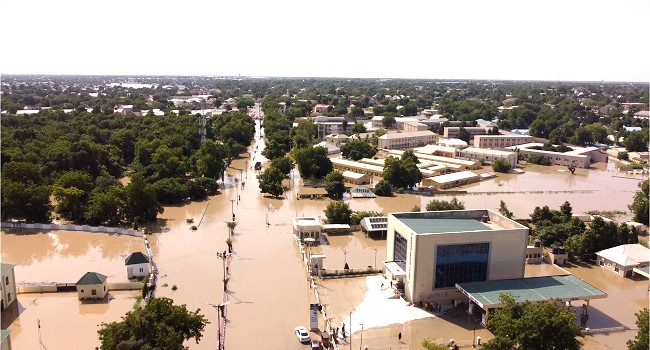The United Nations (UN) humanitarian Coordinator in Nigeria, Mohammed Fall, has announced 6 million dollars from the Nigeria Humanitarian Fund to support flood victims in Borno state.
Alau Dam, located just over 10 miles to the south of Maiduguri, the capital of Borno, collapsed on Sept. 10, forcing hundreds of thousands from their homes.
UN spokesperson, Stephane Dujarric, at a news conference on Monday in New York, said a joint mission made up of UN agencies and NGOs, together with the Nigeria Red Cross Society, visited the main city in the region Maiduguri over the weekend.
Dujarric said they met with people who had been impacted – many of them had already been displaced multiple times by conflict and insecurity in the area.
“We and our partners are providing them with hot meals, we are facilitating air drops of food in hard-to-reach areas cut off by flood waters, and we are also trucking in water.
“We are also providing water and sanitation hygiene services and water purification tablets to stem disease outbreaks.
“This is in addition to supplying hygiene and dignity kits to women and girls, as well as emergency health and shelter services.”
Dujarric said the staff of the UN Office of the Coordination of Humanitarian Affairs (OCHA) were also working closely with donors to secure additional funding.
Across Nigeria, flooding has damaged more than 125,000 hectares of farmland and that was just before the harvest time, and at a time when 32 million people in the country are facing severe food insecurity.
Earlier, Emmanuel Bigenimana, the head of the World Food Programme (WFP) office in Maiduguri, said that he managed to fly over the city in a UN Humanitarian Air Service (UNHAS) helicopter dispatched by WFP, to conduct a rapid assessment of damage and needs.
“What I have seen is really heartbreaking,” he said, describing homes, infrastructure, roads, schools, hospitals submerged by water.
“Many, many people – I’m talking about over 200,000 – 300,000 displaced people – are overcrowded in several IDP (Internally Displaced Persons) camps and also on the streets.”
WFP reported that the dam collapse saw river water overrunning 50 per cent of Maiduguri and state authorities issued evacuation orders to residents in the affected areas, appealing for humanitarian support.
Speaking from the centre of one of the IDP camps, Bigenimana said that WFP had managed to open soup kitchens to provide hot meals to the affected people and was scaling up its response together with the authorities and partners.
The soup kitchens located in three camps – Teachers’ Village, Asheikh and Yerwa – aim to provide nutritious hot meals to “50,000 of the worst affected children, women, and men who have lost their homes,” WFP said, but more assistance is needed.
“This is really an additional burden to already existing crises,” Bigenimana stressed. “This region has been facing conflict for a decade.”
Borno State was one of the areas worst affected by the Boko Haram insurgency which, the UN said earlier this year, has been controlled to some extent.
“More recently, we have seen food inflation, food prices have been skyrocketing, really affecting millions of people who are facing food insecurity,” Bigenimana added.
The impacts of extreme weather are being felt severely across the country.
Some 800,000 people in 29 states in Nigeria have been affected by floods as of September 2024, WFP said, and over 550,000 hectares of cropland have been flooded.
As of March, some 32 million people in the country were already facing acute hunger.
The UN’s food agency said that it needs 147.9 million dollars to support food-insecure people in Nigeria’s northeast over the coming six months.
For the flood-affected populations in Maiduguri, “recovery will take long,” Bigenimana said.
“We need more resources to save lives and to put together efforts to respond to the crises – and also think of longer-term recovery and solutions.”
NAN


